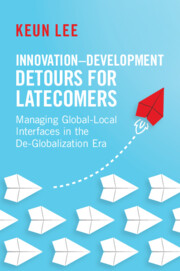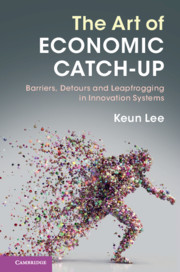Innovation–Development Detours for Latecomers
Many developing countries still face difficulties initiating and sustaining economic development. Such difficulties have been exacerbated by the COVID-19 pandemic, resulting in an increasing divergence between rich and poor countries. One crucial question is whether to follow the trajectories of present-day rich countries or seek out different, new trajectories. Although this is a fundamental question, scholars offering mainstream prescriptions have not sufficiently explored it. Drawing on extensive empirical studies of firms and industries, Innovation and Development Detours for Latecomers proposes an effective alternative to prevailing development thinking. It presents a rich menu of development pathways, including a new role for Schumpeterian states whereby they do not follow the paths of technological development already taken by advanced countries. Rather, they can skip certain stages and even create their own detours thereby leapfrogging advanced countries in both manufacturing and service sectors. This title is also available as Open Access on Cambridge Core.
- Proposes an alternative to prevailing ideas on economic development by saying that multiple pathways for economic catching-up by latecomers are possible
- Emphasizes the importance of strategically maneuvering the global-local interface, thereby promoting emergence of locally-owned big businesses
- Suggest a new perspective on the role of government, which should not decrease in a linear fashion but rather must increase at the upper middle-income stage
- This title is Open Access
Reviews & endorsements
'A richly detailed and highly stimulating book on how latecomers, especially middle-income countries, can overcome the multiple obstacles they face. The key, Keun Lee argues, is not to emulate the experience of rich countries but to develop institutional innovations better suited to their needs – through industrial policies that emphasize domestic knowledge and ownership of firms and mediate the economy's relationship with the global economy, while leveraging the discipline of global competition. Drawing on extensive empirical studies of firms and industries around the world, this book presents a rich menu of development pathways.' Dani Rodrik, Professor, Harvard University
'In this original, thought-provoking book, Keun Lee shows that in a new context of de-globalization, policies and strategies of 'catching up' need to be revised. It is not enough to follow in the tracks of the rich countries or to trust market forces. Multiple pathways with different combinations of local and global knowledge sourcing and learning may be followed. To be successful they require a developmental state with a readiness to initiate detours and leapfrogging.' Bengt Åke Lundvall, Professor, Aalborg University; founder of Globelics
'Few catching-up countries in the world were able to escape the middle-income trap. Based on multi-dimensional, empirical analyses of those successful few in recent decades, Keun Lee challenges conventional wisdoms and provides insightful lessons for firms and governments in other middle-income countries to achieve a similar successful catching up. The key for the success is the changing pattern of interactions between leading firms and the state to foster global competitiveness along the catching-up process. The book is a must-read for business, academic, and policy communities in the developing countries and global development circles.' Justin Yifu Lin, Dean of the Institute of New Structural Economics and Institute of South–South Cooperation and Development, Peking University; former Chief Economist, World Bank
'This book offers a good balance between content for policy makers and for practitioners of innovation seeking growth opportunities in emerging or latecomer markets. … Recommended.' S. Paul, CHOICE
Product details
February 2024Paperback
9781009456265
306 pages
228 × 150 × 16 mm
0.44kg
Available
Table of Contents
- 1. Introduction
- 2. National innovation systems and alternative pathways for latecomers
- 3. From global-local interface to local value added, knowledge, and ownership
- 4. Coevolution of firms with sectoral, regional and nation systems
- 5. Korea's innovation: development detour
- 6. Roles of government along the detours
- 7. Summary and conclusions.






